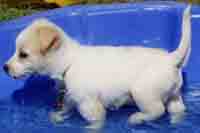
Since the 1960s there have been quantum leaps in what we know about animal psychology and the structure of the nervous system and how it works. Biologists, neurobiologists, zoologists and ethologists - who study animal behaviour, what motivates them and how they learn - have all radically changed how we are able to break down the communication barrier between people and animals of all species.
In dog training many outdated theories have long been discredited. Modern training has changed considerably from the mindset that evolved from the 1947 study by one R. Shenkel of captive wolves in a Swiss zoo that says:"your-Jack-Russell-puppy-is-descended-from-a-wolf-and-therefore-must-be-treated-just-like-a-wolf-treats-other-wolves"
People have always resisted change. It took centuries for most people to agree that the earth is not flat. However, despite the evidence to the contrary, some people in the western world still think it is. The flat Earth Society has a Website with over 3000 members!
In animal training too - particularly with horses and dogs - there has been much scepticism and resistance to new ideas and methods. But an increasing number of people worldwide - whether they are teaching a dog or a dolphin, a pig or a parrot - have questioned whether the beliefs and ways of their fathers and grandfathers are necessarily the best methods.
Over the last few decades there have been incredible advances in education that have equalled the progress in areas such as medicine and communications. Times and attitudes are changing slowly but surely and in dog training many trainers now have a different philosophy and use techniques far removed from the choker/check chain so long synonymous with traditional "dog obedience training" as specified in the "The Police Dogs Training and Care Manual'.
 One of the pioneers of positive reinforcement training was the late John Fisher from the UK, author of several books including 'Dogwise: The Natural Way to Train Your Dog' (1992 - available from Amazon as an eBook). He points out that confusion between what we are trying to teach the dog and what the dog is actually learning lies at the heart of many problems.
One of the pioneers of positive reinforcement training was the late John Fisher from the UK, author of several books including 'Dogwise: The Natural Way to Train Your Dog' (1992 - available from Amazon as an eBook). He points out that confusion between what we are trying to teach the dog and what the dog is actually learning lies at the heart of many problems.
He and a young policeman - who had lost his previous police dog - rescued a 10 month old out-of control German shepherd from death row at the Battersea pound in London.
The policeman and 'Major' had several intensive daily training sessions at John Fisher's home and orchard in Kent. They were both willing and eager students who thrived on John Fisher's philosophy and positive reinforcement training methods which, to some people at that time in England, were (and even today still are in some circles) heretical. The skeptics were dumbfounded when twelve weeks later Major received a 95.5 % pass mark in obedience, agility and tracking, etc., from two London Police force assessors when qualifying as a working police dog.
Positive reinforcement training, as practised by John Fisher and countless trainers since, is sometimes referred to as simply 'reward training'. Desired behaviours are rewarded by the trainer through positive consequences.
[Scientifically speaking - and for the technically inclined - positive reinforcement training is but one of the four quadrants within the 'operant conditioning' framework. In operant conditioning, a term originally coined by Professor B.F.Skinner from Harvard in the 1930s, the animal is the operator in its environment and has a choice to operate how it likes in order to obtain something pleasurable or to avoid something painful or undesirable.
All trainers/dog owners, even if they are unfamiliar with the language or don't realise that they are doing so, use them all the time! Reinforcement, whether it be positive or negative, increases the chances of a behaviour happening. Punishment, whether positive or negative, is designed to reduce or stop the behaviour.]
In the initial stages of training the consequence, or result, of a correctly performed behaviour is usually food. Why? Food is immediate, easy to give, quick to digest, necessary for survival and usually highly desired and therefore highly motivating. But a consequence can be anything the dog finds pleasurable and rewarding. Some dogs are more highly motivated by, say, a tennis ball than they are by food. Provided the dog likes them and finds them rewarding then praise, attention, pats, a tennis ball, toys, games, playing or just going for a walk or a ride in the car should all be used, after the event, as payment for a job well done.
The payment is a reward - whether it be verbal praise, a pat, a piece of dried liver or part of the day's daily meal - for a correct response to a 'stimulus' such as a hand or verbal signal. The reinforcement is the effect of the reward: strengthening (reinforcing as with steel rods in concrete) the behaviour and making it more likely to be repeated in the future.
If the 'Good Dog', or the pat on the head or the dried liver do not influence future behaviour and make it more likely to happen again then they are NOT reinforcers. Overly enthusiastic pats by an owner are in fact punishing for many dogs. Praise soon becomes meaningless background noise. Many people do not understand that food works best only if their dog feels that he has earned it. Aimlessly feeding him a treat for everything quickly devalues food and it becomes useless as a training tool and also, because it it is so often used incorrectly, gives 'food trainers' a bad name.
Behaviours that are broken into small parts and correctly reinforced with good timing are easily learned. Instead of trying to get the whole behaviour in one, our dogs should always succeed - crawl, walk and then run - and learn one step at a time before moving to the next step. If we don't try and go too fast in no time s/he will soon understand and be able to do the entire behaviour voluntarily and enthusiastically.
Properly taught behaviours that are then rewarded/reinforced on a random and unpredictable basis are performed with ever increasing confidence and precision. Undesired behaviours that are not rewarded, but simply noted and ignored, usually soon extinguish and quickly disappear.


